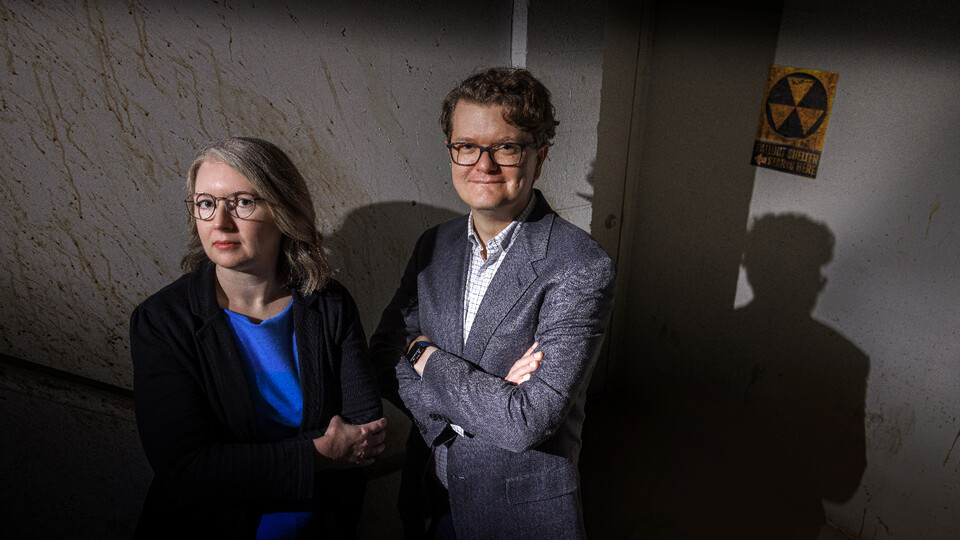Research Alert
Newswise — Nebraska researchers are launching a two-year study of Congress’s involvement in nuclear weapons policy. The study is believed to be the first comprehensive look at the topic in more than 30 years.
Carnegie Corporation of New York recently awarded a $428,000 grant to University of Nebraska–Lincoln political scientists Rupal Mehta, Geoff Lorenz and Ingrid Haas for a multi-method study of Congress and nuclear weapons policy dating back to 1973.
“We believe that this is an important, but missing, piece of the puzzle when it comes to better understanding global nuclear and international security,’” the researchers wrote in their study proposal.
Historically, the president and other executive branch officials have been at the forefront of U.S. nuclear weapons policy, with lawmakers serving a subsidiary role based upon treaty ratification and defense budget allocations. Leaders like U.S. Rep. Don Bacon, R-Neb., an Air Force veteran who serves on the House of Representatives’ Armed Services Committee and U.S. Sen. Deb Fischer, R-Neb., who serves on the Senate’s Armed Forces Committee, often play influential roles in policy decisions based upon personal expertise and constituents’ interest.
“Congress historically has been much more deferential to the president on nuclear policy than on defense policy generally,” said Lorenz, who studies federal lawmaking. “That appears to be changing and so we want to examine the specific factors at play in Congress’s involvement in nuclear arms policymaking.”
Mehta’s work focuses on international security and conflict with a specialization in nuclear nonproliferation and related issues. Haas, a resident faculty member with the university's Center for Brain, Biology and Behavior, uses theory and methods from political psychology and cognitive neuroscience to better understand American politics and international security.
Events in Washington, D.C., and around the world — such as the partisan battle over government funding and the ouster of Kevin McCarthy, R-Calif., as speaker of the House, and the wars in the Ukraine and Gaza — demonstrate the importance of understanding how Congress responds to nuclear policy questions, the researchers say.
Lorenz said the last broad scale study of individual congressional lawmakers’ role in shaping nuclear weapons policy appears to be 1992’s “Congress and Nuclear Weapons,” by former University of Iowa political scientist James M. Lindsay, now an executive with the Council on Foreign Relations think tank. However, much has changed in how Congress operates during the intervening three decades. After Newt Gingrich and the Republicans took control of the House of Representatives in 1994 — ending 60 years of nearly unbroken control by the Democratic Party — it ushered in a period of increased partisan polarization and electoral competition that continues to shape both domestic politics and international relations.
“We’ve been locked in that struggle ever since,” Lorenz observed, “but much of our knowledge on Congress and nuclear policy was generated before that happened.”
“The party competition for control of Congress generates incentives for those who are not in the president’s party to undermine presidential policymaking in this space,” Mehta said. “It makes our commitments to allies and adversaries abroad appear less credible.”
Elements of the project will include a case study analysis of how the 1994 Gingrich Revolution contributed to the demise of the “Agreed Framework,” the Clinton administration’s efforts to rein in nuclear weapons development in North Korea.
Led by Haas, the researchers will conduct an experiment to examine the psychological and neural underpinnings of nuclear policy decision-making. The experiment will attempt to clarify how political identity, information processing and emotion contribute to nuclear policy decisions, in the context of party competition and polarization. A sample of 50 adults, ages 19-65, from the Lincoln, Nebraska, area, will be recruited for the experiment. Their neural responses will be recorded via functional Magnetic Resonance Imaging in the Center for Brain, Biology, and Behavior as they are presented with various scenarios they might face as if they were a member of Congress tasked with a nuclear policy decision.
People interested in being study participants can email [email protected] for more information.
“This can help us make informed predictions about how various actors in these strategic interactions — both allies and adversaries — will respond to these different informational environments,” Haas said.
The researchers will also assemble data about congressional involvement in nuclear weapons policy for each two-year Congress dating back to 1973, with focus on three aspects: relative frequency of oversight hearings and internal congressional research, to measure desire to constrain the executive branch; percentage of speeches, bill introductions and legislative hearings on nuclear weapons-related topics, to measure congressional involvement in policymaking; and analysis of roll-call votes and legislator rhetoric to measure partisan divide on nuclear weapons policy.
The study also will trace how and why individual members of Congress become influential leaders on nuclear weapons issues, adapting for that purpose a gold-standard measure called the Interest and Legislative Effectiveness Score, which quantifies lawmakers’ ability to introduce bills and advance them through the legislative process. Nebraska delegation leaders like Bacon and Fischer are likely to be important examples to study, they added.
“There may be no more important time for these insights than now,” the researchers said in their proposal. “The proliferation of nuclear weapons, and nuclear security more broadly, pose a substantial threat to the security and stability of the international system.”

